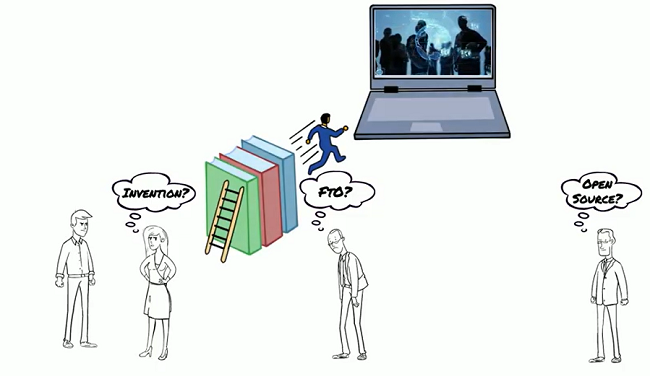Interview with Mr. Korbinian Kopf about continuous education and training in IP management using digital resources
Mr. Kopf, you are an experienced patent attorney who is also involved a lot in international patent litigation, especially for large multinational corporations. Why do you think IP management is becoming increasingly important for companies and also for legal practice?
I myself have not only a technical engineering degree, but also an MBA, because I am firmly convinced that many important issues can only be solved sensibly with an understanding of both disciplines. It starts with the management of one’s own work, which has to be efficient and effective in order to be attractive to clients. I have a lot of experience with this as the long-standing managing director of a law firm with a very dynamic business development and as the founder of my own law firm. But then, this also transitions into an economic and management-oriented holistic understanding of the challenges for my clients, for example, in the development of IP strategies. You also have to understand the language and mindset of the clients, and often the arguments are not purely legal. Business decisions are usually not purely legal issues, so knowledge of IP management with the different subject areas such as strategy, innovation, valuation, organization, business development and leadership is very important for the success of a patent attorney. More and more clients also require the patent attorney to be able to understand economic contexts in order to then be able to give good legal advice and to actively support the clients.
Do you think that continuous education and training is important in IP management, especially for IP experts?
Yes, of course! We live in a knowledge society and knowledge economy and that is not just something we claim. As patent attorneys, we are at the forefront of all questions of technological developments and must always accompany clients in conflicts and help them make decisions. The increasing intangibilisation of the economy is already a reality everywhere. Patent applications for the fourth industrial revolution technologies have increased by 1,400% at the EPO in the last 20 years – this makes the knowledge economy very tangible. Connected to this is the concept of lifelong learning. Part of our profession is curiosity and the fun of acquiring knowledge. We are constantly dealing with complex topics and issues in challenging mandates and both the complexity and the dynamics are continuously increasing.
Professional competence means being up to date with the latest scientific developments. The digital transformation, globalization and the strongly changing framework conditions, such as ESG requirements of the clients, are the challenges to constantly update one’s knowledge and adapt to the circumstances. There are so many examples in different industries, technologies and regions. Take the European patent reform with the Unified Patent Court, the German Patent Law Modernization Act or the so-called standard essential mobile phone patents, which can or must be made available to users on fair terms and without discrimination – to name just a few examples.
 A reliable source that reliably covers such topics, as well as industries and regions, is of great benefit – basically indispensable. You need a transparent platform where the lecturers and their motivation to impart knowledge is clear. Where content is curated according to academic quality criteria. Networking with social media such as LinkedIn is also important – I am active there myself and am always happy to receive and post suggestions and content. That’s why I also follow the CEIPI IP Business Academy to stay up to date on global IP management topics.
A reliable source that reliably covers such topics, as well as industries and regions, is of great benefit – basically indispensable. You need a transparent platform where the lecturers and their motivation to impart knowledge is clear. Where content is curated according to academic quality criteria. Networking with social media such as LinkedIn is also important – I am active there myself and am always happy to receive and post suggestions and content. That’s why I also follow the CEIPI IP Business Academy to stay up to date on global IP management topics.
In your view, is a digital learning platform particularly suitable for imparting know-how on IP management?
LKGLOBAL is at the forefront of digital development. As a fully digital law firm, we will not fall back on analogue technology for further training! We see ourselves as a law firm 4.0 and live it. There is no question: digital learning is the future, there is no doubt in my mind. It is the complement to digital work. Of course, we will still attend events on certain topics, but very selectively – it’s simply a question of effort. Many events are predominantly promotional in several respects. The speakers only want to promote themselves and are not at all interested in a real transfer of know-how, and then the event itself is full of service providers who are not looking for dialogue but want to sell you something.
 The knowledge in a learning management system is bindingly available on demand 24/7 – this is very important especially in the context of international activities. One can view complex content as often as one likes. The expert knowledge is also preserved until it is updated. You can decide for yourself how deeply you want to delve into a subject area. Digital is also faster. Through the link with LinkedIn, the ambassadors, mentors and lecturers, you are informed worldwide and also receive background information on the available course content. If you urgently need topics, you can use the platform to find lecturers who want to share their knowledge and also evaluate them transparently as one of the various quality assurance measures. The platform is open to operators such as law firms and you can create content yourself and make it available to clients via the system. So-called blended learning is also supported and is important in order to prepare and understand complex issues even better.
The knowledge in a learning management system is bindingly available on demand 24/7 – this is very important especially in the context of international activities. One can view complex content as often as one likes. The expert knowledge is also preserved until it is updated. You can decide for yourself how deeply you want to delve into a subject area. Digital is also faster. Through the link with LinkedIn, the ambassadors, mentors and lecturers, you are informed worldwide and also receive background information on the available course content. If you urgently need topics, you can use the platform to find lecturers who want to share their knowledge and also evaluate them transparently as one of the various quality assurance measures. The platform is open to operators such as law firms and you can create content yourself and make it available to clients via the system. So-called blended learning is also supported and is important in order to prepare and understand complex issues even better.
From the company’s point of view, it is of course very much about building up competences and standardizing processes – this can only be done in a binding manner and with an individual learning history via a learning management system. Then it is clearly defined which employees need to know which contents about IP and the associated processes. For a law firm, operating its own LMS also has something to do with employer branding. As a law firm, you make something like this available to your colleagues and thus clearly show how important continuous training and the development of professional competence is.
Dear Mr. Kopf, thank you very much for the interview.
 About Korbinian Kopf
About Korbinian Kopf
Korbinian Kopf was born in 1969 in Munich. He studied Electrical Engineering at the Technische Universität München. Korbinian became Dipl.-Ing. Univ with a master thesis at the Ecole Nationale Supérieure des Télécommunications de Bretagne in Brest, France, in 1994. Thereafter, Korbinian obtained a Masters Degree in Business Administration from the Newcastle Business School of the University of Northumbria in Newcastle, UK, with a master thesis on Chinese Negotiation Culture. Then, Korbinian worked as a consultant with a camera company and a chemical company in Hong Kong and southern China.
Between 1996 and 2000 Korbinian Kopf trained as patent attorney with Hoffman Eitle. After passing the German patent bar in 2000, Korbinian Kopf joined Kenyon & Kenyon in New York. End of 2001, Korbinian Kopf passed the US Patent Agent Exam. He is admitted as German Patent Attorney, European Patent Attorney and as a European Trademark and Design Attorney.
Korbinian joined Maiwald Patentanwalts GmbH in 2002. From 2004 to 2015 Korbinian Kopf was Partner and managing director of Maiwald Patentanwalts GmbH growing the firm from 5 to 80 attorneys.
January 2016, Korbinian started a new international Patent Law Firm with Tim Lorenz. In Germany Dr. Daniel Westenberger, Christian Rackur, Ralph Fernolend and many others joined. There are more than 20 attorneys in Europe and Lorenz & Kopf LLP has 45 attorneys in the US. The firms operate as LKGLOBAL: www.lkglobal.com or www.lk.global.
Korbinian was involved in a number of cross-border litigations in the US and Europe and a very large number of oppositions and nullity suits. Due to his qualification in US Law and EP law, Korbinian has a unique view on ‘international’ cases. Korbinian’s prosecution and litigation portfolio includes major international corporations requiring more than a “national” view.



